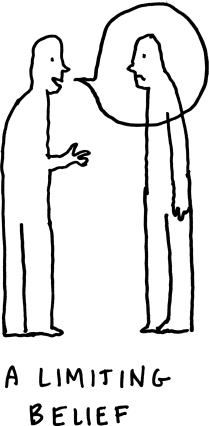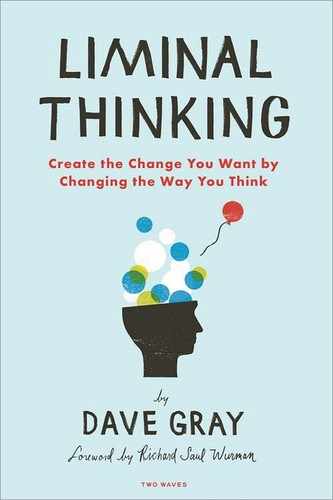PRINCIPLE
4
Beliefs Create Blind Spots
The question is not what you look at, but what you see.
—Henry David Thoreau
In the early 1990s, I worked as a news artist at a newspaper called the Seattle Post-Intelligencer. Even then, it was clear that the newspaper industry was in trouble, so I decided that it was time I found a different career. One of the careers I was thinking about was becoming a university professor. I went to the local university and found an art teacher so I could learn more about it.
He wasn’t very encouraging. He showed me a big stack of resumes and told me, in a very condescending way, that his department received hundreds of applications for every open position, that these positions opened very rarely, and anyway, he didn’t think I was qualified.
Then I spoke with a friend who was teaching art at a local college. He told me there was no way I would be able to get a job as a university teacher without a master’s degree (which I didn’t have).
I didn’t think he was wrong, but I decided to test his belief.
Here’s why: I thought, it’s a lot quicker and easier to apply for a job than it is to get a master’s degree. I know how to apply for a job, so I’ll just try that and see what happens. If it turns out my friend is right, then I haven’t really lost anything. I still can go get a master’s degree. But if he’s wrong, I will have saved myself a lot of time and money.
Can you guess the ending? Yes, I got a teaching job without having a master’s degree.
My friend wasn’t lying to me or trying to mislead me. He was trying to help, by sharing his knowledge about the situation, which was greater than mine. But that knowledge also included a set of beliefs about what was possible, or, perhaps I should say, impossible. His beliefs created a constraint that made certain actions—like applying for a teaching job without a master’s degree—inconceivable, or absurd.
My friend had a limiting belief—a belief that narrowed the range of possibilities.
Let’s say I had taken my friend’s word for it that I needed a master’s degree. That would have created a boundary around what I was able to conceive as possible. That boundary would have reduced the scope and range of my thinking. If I had accepted that limiting belief, I might have spent at least two years and who knows how much money on something that was unnecessary. Or maybe I would not have applied for a teaching job at all, because I would have seen a master’s degree as an expensive, futile effort that made no sense.

Beliefs are necessary. We couldn’t survive without them. They are tools for thinking. We use them to navigate the world, and they guide our actions. But they also limit us. In fact, the words liminal and limit are linked; they share the same Latin root. The same boundaries that make it possible for us to think also limit what we can conceive.
Even your closest friends, with the best of intentions, may have limiting beliefs that close off possibilities and opportunities that would otherwise be open to you.
This is what I mean by thresholds and doorways. There are opportunities around you all the time, every day, and in many cases you are unable to see them, because limiting beliefs blind you to real possibilities.
Liminal thinking is a way to identify limiting beliefs and open yourself to hitherto unseen possibilities that can open new doors.
PRINCIPLE 4
Beliefs create blind spots.
Beliefs are tools for thinking and provide rules for action, but they can also create artificial constraints that blind you to valid possibilities.
